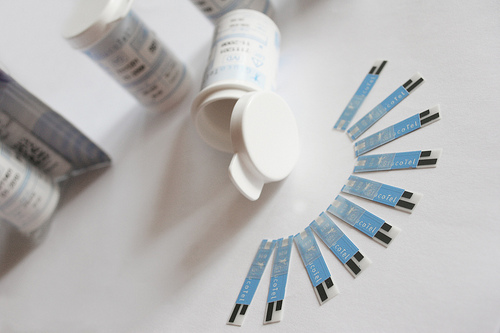A male aged 70 years [1][2], with respiratory failure[3] due to chronic obstructive air disease (COAD)[4]. He was admitted to ICU and his blood gas analysis[5] was done immediately. He was resuscitated[6] and had over enthusiastic mechanical ventilation .His acid base parameters of blood were as under.
| On Admission | After 5 hours Ventilation | ||||||
| Blood | pH | 7.19 | 7.66 | (7.35-7.45) | |||
| H+ | nmol/L | 64 | 22 | (35-45) | |||
| PCO2 | mmHg | 97 | 31 | (35-45) | |||
| PO2 | mmHg | 57 | 74 | (80-110) | |||
| HCO3– | mmol/L | 36 | 35 | (24-32) | |||
Learning Objectives:
The students are required to know the following:
1. What is the diagnosis at the time of admission?
2. What is the diagnosis after five hours of ventilation?
3. Respiratory acidosis and its causes.
4. Respiratory alkalosis and its causes.
5. How the kidneys will compensate respiratory acidosis and respiratory alkalosis?
Discussion:
[1] Age:
Males are prone to stress and smoking, especially among the labourers and poor. Most are exposed to the second hand smoke while going to work places in urban areas. Villagers smoke hukah.
[2] Old age is accompanied by decreased formation of proteins which decrease the basal metabolic rate. Elasticity of the lungs and other tissues are also decreased. Lung capacities are decreased. In short body undergoes overall degenerative changes.
[3] Respiratory failure
Respiratory failure is a syndrome in which the respiratory system fails in one or both of its functions i.e. oxygenation and removal of carbon dioxide.PA O2 less than 60 mmHg and PA CO2 greater than 50 mmHg. It can be caused by abnormality of airways, alveoli, CNS, peripheral nervous system, respiratory muscles and chest wall.It may be secondary to cardiogenic, hypovolemic or septic shock.
[4] COAD
Chronic obstructive pulmonary disease is characterized by narrowing of airway passages, which leads to increased resistance to airways. Due to which oxygen and carbondioxide can not be effectively exchanged at the respiratory membrane. Causes of COPDs include emphysema, pneumonia, smoking, infection etc.
[5] Blood gas analysis
Blood gas analysis is performed with an instrument that can measure pH,Pco2 and Po2 simultaneously.Blood sample is taken from radial artery and for some reason radial pulse is not detected, it may be taken from brachial or femoral artery.Instrument consists of electrodes and electrolyte solution.
[6] Resuscitation
Resuscitation means to bring about consciousness of the person. It can be done by mechanically or manually.
Lab tests:
On Admission:
1. pH is decreased indicating acidosis.
2. [H+] is increased.
3. PCO2 is increased due to COPD It is the reason for H+ ion imbalance.
4. PO2 is decreased due to similar reason.
5. HCO3- is increased as compensation by kidney.
After 5 Hours:
1. pH is increased indicating alkalosis.
2. [H+] is decreased.
3. PCO2 is decreased due to over mechanical ventilation.
4. PO2 is nearing normal levels.
5. HCO3- is not markedly changed.
Learning Objectives:
Diagnosis at the time of admission
Partially compensated Respiratory Acidosis.
Diagnosis after 5 hours
Acute(uncompensated) Respiratory alkalosis.(mixed metabolic and respiratory alkalosis)
Respiratory acidosis
Increased PCO2 and decreased pH indicates respiratory acidosis, it can be caused by CNS depression, drug overdose, NMJ disorder, Myopathies, thoracic disorders and lung disorders.
Respiratory alkalosis
Decreased PCO2 and increased pH indicates respiratory alkalosis , it is caused by hyperventilation, anxiety and high altitude.
Compensation:
Acidosis: Increased secreation of H+ and increased HCO3- reabsorption.
Alkalosis: Decreased secreation of H+ and decreased HCO3- reabsorption.
This article is dedicated to my parents whose guidance enabled me to understand and learn.
 howMed Know Yourself
howMed Know Yourself




good job….